Amy Neftzger's Blog, page 2
April 19, 2016
My 5 Darkest Parenting Secrets
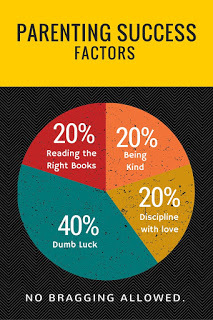
My kids are nearly grown now (crossing fingers here). But I have to confess that there were times when I took an unconventional approach to raising them. Let's face it: parenting is more or less a survival game, and if you let the kids win you're doomed. I admit that I made it through by using some unconventional tactics in my strategy, but I'm willing to share my dark secrets in the hope that these will bring other parents through this journey (mostly) unscathed.
Dark Secret #1:
The Broccoli Emporium isn’t actually my favorite restaurant because it isn’t a real place at all.
Whenever we were on road trips I told my kids The Broccoli Emporium was my favorite restaurant and we would stop there for our next meal if they didn’t behave in the car.
“Is everything made out of broccoli there?”
“Yes. Even the milkshakes.”
Worked like a charm. No regrets on that one.
Note: this technique works best on small children before they can actually read billboards.
Dark Secret #2:
When she was about three my daughter loved watching the child catcher scene from Chitty Chitty Bang Bang, so I let her.
Apparently she thought the rest of the movie was boring, so I played that scene over and over for her while she snacked on goldfish. If a kid finds terror entertaining, I don't feel that we, as parents, should restrict them and deny them what they crave. After all, an electronic babysitter is only as good as the content. BTW - Now she’s in college and enjoys reading HP Lovecraft, so I obviously did something right.
Dark Secret #3: More than once I’ve thought about texting one of my kids and saying, “Please don’t come home until I figure out how to dispose of your body.”
They were teenagers. Need I say more?
The point is I never sent those texts. At least not on purpose, anyway.
But even if I sent them, the kids learned that everyone has limits, even "sweet mommy."
Dark Secret #4: I let my children watch all kinds of TV shows and movies that more conservative parents frowned upon.
I made it a rule that my kids could watch anything as long as I watched it with them, and I did. I asked just enough dumb questions to keep them from renting anything they didn’t want to have to explain to me. There's nothing like pure embarrassment for behavior modification.
Of course, I wouldn't do that now because they learned from the best and I'm sure they'd put in a movie that made me very uncomfortable and enjoy asking me questions about it.
Free parenting tip: stop while you're ahead and learn to anticipate potential revenge situations.
Dark Secret #5: The Internet in my house magically stopped working whenever anyone had a big test the next day.
Actually, that wasn’t me. Comcast is simply unreliable. My Internet stopped working all the time for no reason, but I like to think that subscribing to Comcast was part of my nefarious plan to keep the kids focused on their schoolwork.
Let's face it, we're all going to be scarred by our parenting experiences, but at least my children's therapists won't be bored during those decades of counseling ahead.
Published on April 19, 2016 05:30
March 24, 2016
14 Crazy Church Posts In Preparation For Easter
 With Easter rapidly approaching, some of us may be planning to attend church for the first time in quite a while. Occasionally while visiting churches I like to pretend that I'm a visitor from another planet and just learning about the culture and customs of church. Here are a few of my posts on social media from these occasions. Important notes for reference: Mr Amy is the Music Director for all of these services, we live in Nashville where every church service is a major production, and I do play the drums.
With Easter rapidly approaching, some of us may be planning to attend church for the first time in quite a while. Occasionally while visiting churches I like to pretend that I'm a visitor from another planet and just learning about the culture and customs of church. Here are a few of my posts on social media from these occasions. Important notes for reference: Mr Amy is the Music Director for all of these services, we live in Nashville where every church service is a major production, and I do play the drums.Enjoy.
You know what the best thing about church is? They serve wine at 8:00 in the morning and no one thinks it's weird.
This morning's episode of Church Service is subtitled "The Wrath of Mom", where the character of Mom forces the children who were not ready on time to drink the substandard church coffee instead of stopping at Starbucks on the way there. Mom's cruelty knows no bounds!!!
In this morning's production of Church Service all parts had been previously cast, so I created the role of "Assistant Sound Engineer" because there are too many buttons on that board for one pair of hands. Plus I really want to mess with the sound levels while people are talking.
As "Assistant Sound Engineer" I have the power to mute anyone who says something I don't like. Carry on, Preacher. Carry on.
This morning in Church Service I've decided to enhance the pastor's reading by replacing the scripture verses with selections from Kerouac.
Good news! I've found some interpretive dancers to join in today's special beatnik production of Church Service. Won't the pastor be surprised when they rush the stage during the 3rd act!
The woman sitting next to me mumbled incessantly throughout the Church Service production, and I found it very distracting and disrespectful while I was typing all my text messages.
In order to make today's production of Church Service more interesting, I've decided that I will only speak using lyrics from songs by The Who.
Pastor: How are you doing today?
Amy: No one knows what it's like to be the bad man ... to be the sad man.
Pastor: Are you okay? Did you have trouble sleeping or something?
Amy: My dreams... They aren't as empty as my conscience seems to be.
Pastor: Let me go find your husband for you.
I love going to church because I always learn something. Today I learned that you're not supposed to use the leftover communion bread to make a sandwich and that "the alter is not a kitchen table."
In this morning's production of "Church Service" I've been assigned to the role of "Congregation Member." I have no solos. As a protest, I've painted my eyelids in the shade of "Yellow Scream." I'm planning to blink at the director so he can see my eyes screaming at him.
Good news! I downloaded a cowbell app for my phone and grabbed a wireless mic. Now I can add cowbell to all the songs from anywhere in the sanctuary!!!
In this morning's production of "Church Service" I'm playing the role of Slideshow Bob. This means that I push the button to change slides on the big screen. I'm thinking about editing the slides to make the service more entertaining.
So... "Running With the Devil" was not the best choice of music for exiting the church service, but I was only trying to get the crowd pumped.
Happy Easter, everyone!
Published on March 24, 2016 05:08
March 15, 2016
My 15 Best Books of 2015
For those looking for something new to read or who want to discover something new, I’ve compiled this list of my top-rated books from 2015. Most of these were released in 2015, but several are older books that finally got off my TBR list. There were a lot of good books released or read in 2015, but these are my picks (in the order that I read them).
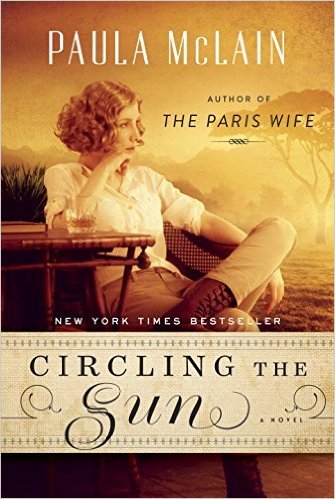 Title: Circling the Sun
Title: Circling the Sun
Author: Paula McLain
Genre: Historical Fiction
Brilliant writing and great storytelling have come together to produce a very rich historical fiction novel. Beryl Markham is a strong female character during a time when being a strong woman could get you killed for asserting yourself or for attempting to maintain an identity apart from being property.
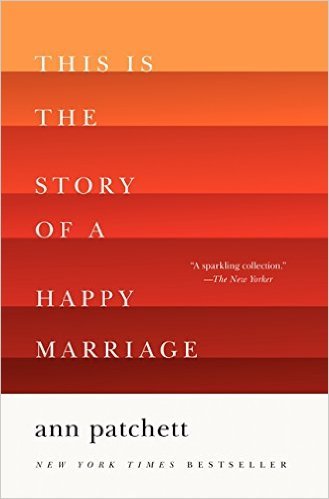
Title: This is the Story of a Happy Marriage
Author:Ann Patchett
Genre: Nonfiction
If you want an example of how to write great nonfiction this is the book to read. This is a collection of essays Overall, this is a great read should certainly be on the TBR list of anyone who wants a career as a writer.
 Title: Get in Trouble
Title: Get in Trouble
Author: Kelly Link
Genre: Fiction (experimental)
A wonderful collection of short stories that transcend traditional genres. The writing is experimental and yet accessible. Some of the characters are bizarre, yet still relate-able (not a real word, but now that I've spoken it into existence it will hopefully show up in the dictionary soon). If you like unusual and innovative writing this book is for you.
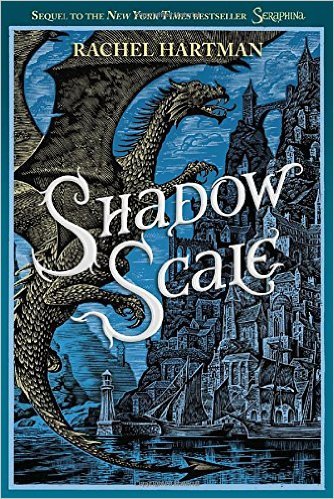 Title: Shadow Scale (Seraphina #2)
Title: Shadow Scale (Seraphina #2)
Author:Rachel Hartman
Genre: YA Fantasy
This may be one of the best books I've read in the past year. It's about a girl on a diplomatic mission to bring the half-dragons together, but she's also struggling to come into her own as the world appears to be falling apart. Cleverly and imaginatively written with strong female characters on the sides of both good and evil, this book kept me reading and turning pages.
An exciting read with interesting (as well as likable) characters and a strong, well-developed plot. Highly recommended for individuals who enjoy fantasy books.
 Title: The Cloister Walk
Title: The Cloister Walk
Author:Kathleen Norris
Genre: Nonfiction
This is a book that I thought I could read straight though and move on to the next novel on my TBR list, but it wasn't that simple. Norris has the poet's eye for insight and the material written here includes some beautifully written prose with keen observations on life and humanity.
If you're a fan of authors such as Thomas Merton I recommend giving this book a slow and thoughtful read.
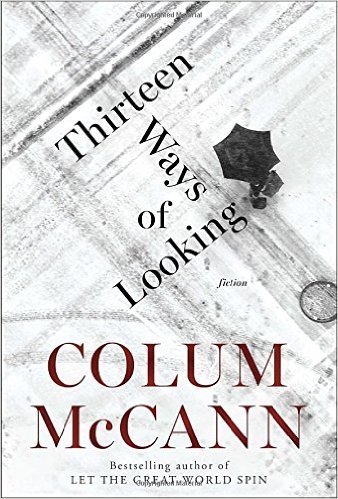 Title: Thirteen Ways of Looking
Title: Thirteen Ways of Looking
Author:Colum McCann
Genre: Fiction
This was one of the most well-written books I've read this past year. It consists of a novella and several short stories: each one unique and addressing a different topic. My favorite is the first (and longest) about an elderly widower that chronicles his last days on earth. The stories in this volume are beautifully constructed and the prose is outstanding.
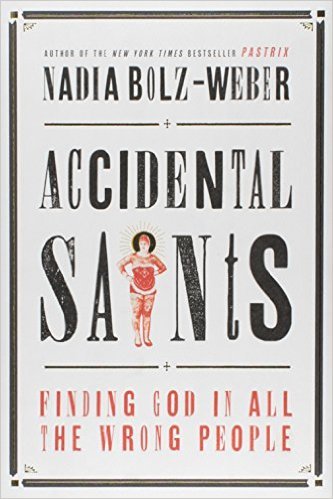 Title: Accidental Saints: Finding God in All the Wrong People
Title: Accidental Saints: Finding God in All the Wrong People
Author:Nadia Bolz-Weber
Genre: Nonfiction
Nadia Boltz-Weber's writing is raw and honest. She asks a lot of questions, and sometimes those questions don't have answers. There's no formula on how to live a perfect life or list of rules to follow in order to gain sainthood in this book. However, what the author does show us how to do is recognize the beauty in other people, even when it takes unconventional forms. I got to interview the author about this book (Englewood Review of Books, print edition).
 Title: We Never Asked for Wings
Title: We Never Asked for Wings
Author: Vanessa Diffenbaugh
Genre: Fiction
Diffenbaugh writes about individuals on the edge of society and makes them accessible to the mainstream. It's difficult not to become engaged with the characters the way that she writes them. Even when they make bad decisions, instead of judging these characters I felt myself cringing while filling with empathy for the heartaches that resulted. Well constructed and emotionally rich. If you loved The Language of Flowers you should definitely read this one. Be prepared for another bumpy ride that you will be glad you took.
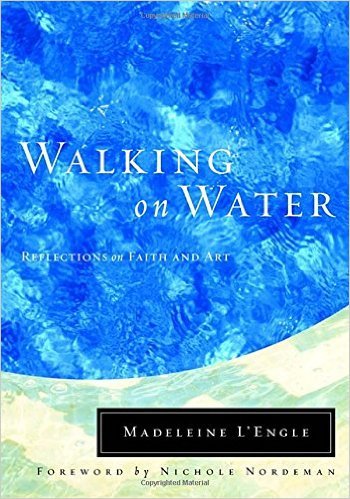 Title: Walking on Water: Reflections on Faith and Art
Title: Walking on Water: Reflections on Faith and Art
Author: Madeline L’Engle
Genre: Nonfiction
This book is one of the best I've read for artists who also happen to have a strong religious faith. L'Engle approaches creativity as a natural response to being created in the image of The Creator. In fact, she explains that most children start out creative, but wander (or are trained) away from these activities. What I respected most was her assertion that art designed to evangelize tends to be come across as forced, and is often lower quality because of this.
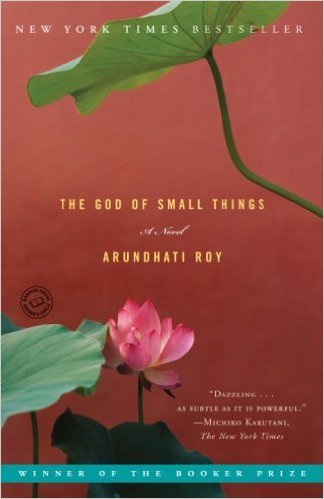 Title: The God of Small Things
Title: The God of Small Things
Author: Arundhati Roy
Genre: Fiction
The book is set in India and follows the lives of twins (a boy and a girl) through the early events that shaped them. It's a tale of childhood, innocence lost, and forbidden love The prose is sometimes filled with passages that convey both the bitterness and romance of childhood. Be forewarned: there is no shortage of loss in this book (it's a tragedy), but the writing is poetic.
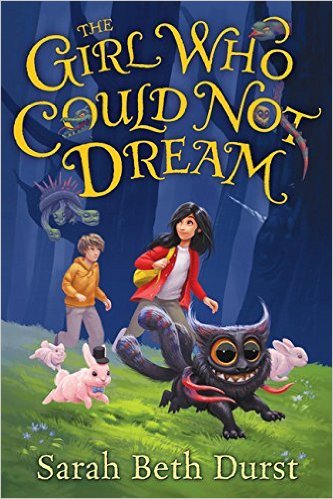 Title: The Girl Who Could Not Dream
Title: The Girl Who Could Not Dream
Author:Sarah Beth Durst
Genre: Children’s Fiction
A highly imaginative look at dreams, the importance of childhood friends, and learning to deal with fear. Although Sophie in unable to dream on her own, when she ingests the dreams of others the things in the dream become real. This is a great way to explore the line between reality and dreams and the importance of each. Durst write some great characters, including a lovable monster, a vain Unicorn/ Pegasus, and a sinister villain called "Mr. Nightmare." The story moves at a good pace and takes the reader on a few unexpected twists and turns.
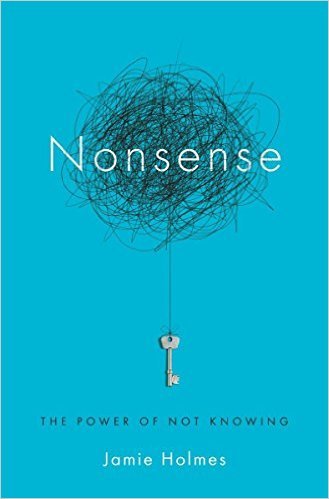 Title: Nonsense: The Power of Not Knowing
Title: Nonsense: The Power of Not Knowing
Author:Jamie Holmes
Genre: Nonfiction
This book brings together several different cognitive theories to help understand how different individuals deal with ambiguous information. While some individuals have a high need for context, others are more comfortable when new information doesn't neatly fit into their current understanding of the world. This is a great book for learning how to understand different points of view and how some individuals choose to interpret events differently from others.
 Title: Little Man, What Now?
Title: Little Man, What Now?
Author:Hans Fallada
Genre: Fiction
An interesting read that gives insight into what it was like to be a white collar worker in Berlin just prior to WWII. This is a fictional account of two newlyweds, but it should be noted that the author did extensive research on the subject and managed to portray an accurate picture of the struggles at the time. What makes the book so engaging is the humorous aspect that pervades the story - some critics have compared the main character to Charlie Chaplin's Little Tramp. A series of unfortunate events are consistently cushioned by the humor in the characters and plot line.
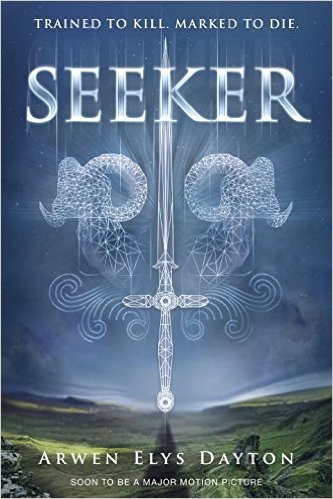 Title: Seeker
Title: Seeker
Author: Arwen Elys Dayton
Genre: Children’s Fiction
The best way to describe this book is as a modern tale of knighthood, with the added twist of vying for power and position. Seekers are a special group of individuals who are supposed to work for the good of humanity, but Quin quickly learns that not all the protectors of the truth are actually protecting it and some are out for personal gain.
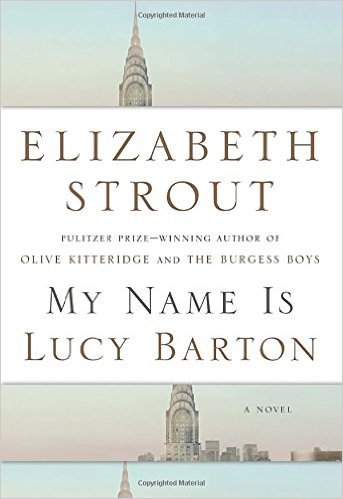 Title: My Name Is Lucy Barton
Title: My Name Is Lucy Barton
Author: Elizabeth Strout
Genre: Fiction
The story centers on a woman who is hospitalized for an illness, which is the point in time from which she begins to make sense of all the imperfect forms of love she's experienced in her life. Central to this insight is her relationship with her mother who comes to stay with her during those few days when the doctor is trying to figure out the cause of the illness. The writing is solid and the book does a great job of exploring the basic need for love, even in it's most broken forms.
If you see something that interests you, check out a few other reviews on Amazon or Goodreads to get a slightly different perspective and see if one of these could be the treasure from 2015 that you missed. Please don’t forget to come back and leave me a comment on how you liked the book!
 Title: Circling the Sun
Title: Circling the Sun Author: Paula McLain
Genre: Historical Fiction
Brilliant writing and great storytelling have come together to produce a very rich historical fiction novel. Beryl Markham is a strong female character during a time when being a strong woman could get you killed for asserting yourself or for attempting to maintain an identity apart from being property.

Title: This is the Story of a Happy Marriage
Author:Ann Patchett
Genre: Nonfiction
If you want an example of how to write great nonfiction this is the book to read. This is a collection of essays Overall, this is a great read should certainly be on the TBR list of anyone who wants a career as a writer.
 Title: Get in Trouble
Title: Get in Trouble Author: Kelly Link
Genre: Fiction (experimental)
A wonderful collection of short stories that transcend traditional genres. The writing is experimental and yet accessible. Some of the characters are bizarre, yet still relate-able (not a real word, but now that I've spoken it into existence it will hopefully show up in the dictionary soon). If you like unusual and innovative writing this book is for you.
 Title: Shadow Scale (Seraphina #2)
Title: Shadow Scale (Seraphina #2)Author:Rachel Hartman
Genre: YA Fantasy
This may be one of the best books I've read in the past year. It's about a girl on a diplomatic mission to bring the half-dragons together, but she's also struggling to come into her own as the world appears to be falling apart. Cleverly and imaginatively written with strong female characters on the sides of both good and evil, this book kept me reading and turning pages.
An exciting read with interesting (as well as likable) characters and a strong, well-developed plot. Highly recommended for individuals who enjoy fantasy books.
 Title: The Cloister Walk
Title: The Cloister WalkAuthor:Kathleen Norris
Genre: Nonfiction
This is a book that I thought I could read straight though and move on to the next novel on my TBR list, but it wasn't that simple. Norris has the poet's eye for insight and the material written here includes some beautifully written prose with keen observations on life and humanity.
If you're a fan of authors such as Thomas Merton I recommend giving this book a slow and thoughtful read.
 Title: Thirteen Ways of Looking
Title: Thirteen Ways of LookingAuthor:Colum McCann
Genre: Fiction
This was one of the most well-written books I've read this past year. It consists of a novella and several short stories: each one unique and addressing a different topic. My favorite is the first (and longest) about an elderly widower that chronicles his last days on earth. The stories in this volume are beautifully constructed and the prose is outstanding.
 Title: Accidental Saints: Finding God in All the Wrong People
Title: Accidental Saints: Finding God in All the Wrong People Author:Nadia Bolz-Weber
Genre: Nonfiction
Nadia Boltz-Weber's writing is raw and honest. She asks a lot of questions, and sometimes those questions don't have answers. There's no formula on how to live a perfect life or list of rules to follow in order to gain sainthood in this book. However, what the author does show us how to do is recognize the beauty in other people, even when it takes unconventional forms. I got to interview the author about this book (Englewood Review of Books, print edition).
 Title: We Never Asked for Wings
Title: We Never Asked for WingsAuthor: Vanessa Diffenbaugh
Genre: Fiction
Diffenbaugh writes about individuals on the edge of society and makes them accessible to the mainstream. It's difficult not to become engaged with the characters the way that she writes them. Even when they make bad decisions, instead of judging these characters I felt myself cringing while filling with empathy for the heartaches that resulted. Well constructed and emotionally rich. If you loved The Language of Flowers you should definitely read this one. Be prepared for another bumpy ride that you will be glad you took.
 Title: Walking on Water: Reflections on Faith and Art
Title: Walking on Water: Reflections on Faith and Art Author: Madeline L’Engle
Genre: Nonfiction
This book is one of the best I've read for artists who also happen to have a strong religious faith. L'Engle approaches creativity as a natural response to being created in the image of The Creator. In fact, she explains that most children start out creative, but wander (or are trained) away from these activities. What I respected most was her assertion that art designed to evangelize tends to be come across as forced, and is often lower quality because of this.
 Title: The God of Small Things
Title: The God of Small ThingsAuthor: Arundhati Roy
Genre: Fiction
The book is set in India and follows the lives of twins (a boy and a girl) through the early events that shaped them. It's a tale of childhood, innocence lost, and forbidden love The prose is sometimes filled with passages that convey both the bitterness and romance of childhood. Be forewarned: there is no shortage of loss in this book (it's a tragedy), but the writing is poetic.
 Title: The Girl Who Could Not Dream
Title: The Girl Who Could Not DreamAuthor:Sarah Beth Durst
Genre: Children’s Fiction
A highly imaginative look at dreams, the importance of childhood friends, and learning to deal with fear. Although Sophie in unable to dream on her own, when she ingests the dreams of others the things in the dream become real. This is a great way to explore the line between reality and dreams and the importance of each. Durst write some great characters, including a lovable monster, a vain Unicorn/ Pegasus, and a sinister villain called "Mr. Nightmare." The story moves at a good pace and takes the reader on a few unexpected twists and turns.
 Title: Nonsense: The Power of Not Knowing
Title: Nonsense: The Power of Not Knowing Author:Jamie Holmes
Genre: Nonfiction
This book brings together several different cognitive theories to help understand how different individuals deal with ambiguous information. While some individuals have a high need for context, others are more comfortable when new information doesn't neatly fit into their current understanding of the world. This is a great book for learning how to understand different points of view and how some individuals choose to interpret events differently from others.
 Title: Little Man, What Now?
Title: Little Man, What Now?Author:Hans Fallada
Genre: Fiction
An interesting read that gives insight into what it was like to be a white collar worker in Berlin just prior to WWII. This is a fictional account of two newlyweds, but it should be noted that the author did extensive research on the subject and managed to portray an accurate picture of the struggles at the time. What makes the book so engaging is the humorous aspect that pervades the story - some critics have compared the main character to Charlie Chaplin's Little Tramp. A series of unfortunate events are consistently cushioned by the humor in the characters and plot line.
 Title: Seeker
Title: SeekerAuthor: Arwen Elys Dayton
Genre: Children’s Fiction
The best way to describe this book is as a modern tale of knighthood, with the added twist of vying for power and position. Seekers are a special group of individuals who are supposed to work for the good of humanity, but Quin quickly learns that not all the protectors of the truth are actually protecting it and some are out for personal gain.
 Title: My Name Is Lucy Barton
Title: My Name Is Lucy BartonAuthor: Elizabeth Strout
Genre: Fiction
The story centers on a woman who is hospitalized for an illness, which is the point in time from which she begins to make sense of all the imperfect forms of love she's experienced in her life. Central to this insight is her relationship with her mother who comes to stay with her during those few days when the doctor is trying to figure out the cause of the illness. The writing is solid and the book does a great job of exploring the basic need for love, even in it's most broken forms.
If you see something that interests you, check out a few other reviews on Amazon or Goodreads to get a slightly different perspective and see if one of these could be the treasure from 2015 that you missed. Please don’t forget to come back and leave me a comment on how you liked the book!
Published on March 15, 2016 06:00
February 23, 2016
5 Reasons Why Trump Will Never Make America Great

Many individuals have embraced Trump as an outsider who has the potential to save the American political system from itself. I view him as just another symptom of a broken system. There are numerous reasons why I don’t think he can “make America great again.” Here are five of them.
1. Lack of tact and diplomacyI'm done talking about politics for now. If you want to read more on the subject, I highly recommend this well-written piece by Kareem Abdul Jabbar in The Washington Post.
There are a number of skills that I think are essential for The President of the United States, and two of these near the top of the list are diplomacy and tact. We don’t need to get into wars or have trade talks stalled because our leader said whatever he felt like saying or felt that another world leader was beneath him.
2. Arrogance
The best politicians understand that they’re public servants, and the most effective leaders don’t put themselves first. Trump’s tendency toward arrogance is on the opposite end of the spectrum. Of all the things we’ve seen from Trump, acting out of service for the common good is not one of them.
3. He doesn’t represent what’s best about America
The President of the United States needs to represent the interests and the people of the country as a whole. Donald Trump has already made glib statements about different segments of the American population that indicate he feels some people are more equal than others. Differential treatment of people based on race or ethnicity is not something to be proud of, and it’s something that America has been working to eliminate.
4. He’s part of the problem
Most of what isn’t working in politics is the result of special interest groups putting their needs above society as a whole. Trump is just another variation on this theme: his special interests are the business sector and his ego.
5. Only the American people can make America great
We need to stop electing our officials based on what benefits us personally or financially at the expense of others, and start behaving as if all individuals really are created equal and that every living person has value.
Published on February 23, 2016 06:46
February 3, 2016
Why I'm Not Voting For Trump
I don’t usually voice political opinions for two reasons:
1. As a writer, I know that there are always at least three sides to every story and there are as many interpretations of current events as there are people. Most of us tend to vote for the individual we think will make life better for us personally. And since I’m not you, I have no idea how to tell you to vote.
2. I don’t believe either political party has the answer - they only have alliances (often of the corporate and unsavory kind).
However, today I’m going to break my rule of avoiding politics, and while I won’t say who I’ll be voting for I’ll explain why I don’t think that Donald Trump is the answer to what’s ailing America right now.
My first reason:
1. Success is a stable track record that will generalize into a new field
People who are successful in business aren’t always successful. In fact, most of these individuals have also failed a number of times. The smart ones protect themselves so that when the business goes under they don’t go personally bankrupt - which is what Trump has managed to do each time one of his enterprises collapsed. Governments, however, don’t have the same sort of luxury, unless the officials take risks and the taxpayers foot the bill when those risks don’t pay off (sort of like Congress has been doing for years …).
2. Government is just another form of a business
While some of the components are similar, business and government have different goals. The purpose of a business is to make money. The purpose of government, on the other hand, is embedded within the name: it’s to govern. There are no investors to repay or stock prices to maintain. Ideally, citizens should be taxed only enough to run the necessary programs and services and ensure that those programs continue.
3. A CEO knows how to get things done in any situation
Because these two institutions have different goals, the rules made within businesses are very different from laws made by governments. In a business all employees are not considered equal, and your value is determined by how much the organization stands to gain financially from your job performance. In other words, equality is not guaranteed in a business setting.
I don’t want to spend an inordinate amount of time on this point, but a government is not simply another form of business: it’s public service and in a democracy it’s built on the concept of being “by the people, for the people.” It’s not a profit center.
Enough seriousness for one day.
I’ll leave you with something to make you laugh:
1. As a writer, I know that there are always at least three sides to every story and there are as many interpretations of current events as there are people. Most of us tend to vote for the individual we think will make life better for us personally. And since I’m not you, I have no idea how to tell you to vote.
2. I don’t believe either political party has the answer - they only have alliances (often of the corporate and unsavory kind).
However, today I’m going to break my rule of avoiding politics, and while I won’t say who I’ll be voting for I’ll explain why I don’t think that Donald Trump is the answer to what’s ailing America right now.
My first reason:
The idea that someone who’s successfully run a business can fix the problems we’re having with government is a fallacy.I’m not sure where this idea originated, and I’ve heard it for years. There seems to be a prevalent idea that someone who’s been successful in business must also have the best sort of expertise to run the government effectively. This logic is not new, but I don’t know if anyone has ever taken a look at the underlying assumptions. I'll address three of these underlying assumptions in this post, but there are more.
1. Success is a stable track record that will generalize into a new field
People who are successful in business aren’t always successful. In fact, most of these individuals have also failed a number of times. The smart ones protect themselves so that when the business goes under they don’t go personally bankrupt - which is what Trump has managed to do each time one of his enterprises collapsed. Governments, however, don’t have the same sort of luxury, unless the officials take risks and the taxpayers foot the bill when those risks don’t pay off (sort of like Congress has been doing for years …).
2. Government is just another form of a business
While some of the components are similar, business and government have different goals. The purpose of a business is to make money. The purpose of government, on the other hand, is embedded within the name: it’s to govern. There are no investors to repay or stock prices to maintain. Ideally, citizens should be taxed only enough to run the necessary programs and services and ensure that those programs continue.
3. A CEO knows how to get things done in any situation
Because these two institutions have different goals, the rules made within businesses are very different from laws made by governments. In a business all employees are not considered equal, and your value is determined by how much the organization stands to gain financially from your job performance. In other words, equality is not guaranteed in a business setting.
I don’t want to spend an inordinate amount of time on this point, but a government is not simply another form of business: it’s public service and in a democracy it’s built on the concept of being “by the people, for the people.” It’s not a profit center.
Enough seriousness for one day.
I’ll leave you with something to make you laugh:
Published on February 03, 2016 06:30
December 15, 2015
20 Quotes About Writing
I collect quotes. I have notebooks filled with them. So I dug through the secret place in my sock drawer where I keep all these quote-filled notebooks and dug up a list of 20 about writing and ficiton. Here they are.
“Write the kind of story you would like to read. People will give you all sorts of advice about writing, but if you are not writing something you like, no one else will like it either.”
~ Meg Cabot
The reason that fiction is more interesting than any other form of literature, to those who really like to study people, is that in fiction the author can really tell the truth without humiliating himself.”
~ Eleanor Roosevelt
“You can't wait for inspiration. You have to go after it with a club.”
~ Jack London
“I would advise anyone who aspires to a writing career that before developing his talent he would be wise to develop a thick hide.”
~ Harper Lee
“And by the way, everything in life is writable about if you have the outgoing guts to do it, and the imagination to improvise. The worst enemy to creativity is self-doubt.”
~ Sylvia Plath
“The greatest part of a writer’s time is spent in reading, in order to write; a man will turn over half a library to make one book.”
~ Samuel Johnson
“Write while the heat is in you. … The writer who postpones the recording of his thoughts uses an iron which has cooled to burn a hole with.”
~ Henry David Thoreau
“No tears in the writer, no tears in the reader. No surprise in the writer, no surprise in the reader.”
~ Robert Frost
“Keep a small can of WD-40 on your desk~away from any open flames~to remind yourself that if you don’t write daily, you will get rusty.”
~George Singleton
“Those who find ugly meanings in beautiful things are corrupt without being charming. This is a fault. Those who find beautiful meanings in beautiful things are the cultivated. For these there is hope. They are the elect to whom beautiful things mean only Beauty. There is no such thing as a moral or an immoral book. Books are well written, or badly written. That is all.”
~ Oscar Wilde
“Cheat your landlord if you can and must, but do not try to shortchange the Muse. It cannot be done. You can’t fake quality any more than you can fake a good meal.”
~ William S. Burroughs
“You must stay drunk on writing so reality cannot destroy you.”
~ Ray Bradbury
“You should write because you love the shape of stories and sentences and the creation of different words on a page. Writing comes from reading, and reading is the finest teacher of how to write.”
~ Annie Proulx
“Writing is like sex. First you do it for love, then you do it for your friends, and then you do it for money.”
~ Virginia Woolf
“We have to continually be jumping off cliffs and developing our wings on the way down.”
~ Kurt Vonnegut
“Start writing, no matter what. The water does not flow until the faucet is turned on.”
~ Louis L’Amour
“I write to give myself strength. I write to be the characters that I am not. I write to explore all the things I'm afraid of. ”
~ Joss Whedon
“We are all apprentices in a craft where no one ever becomes a master.”
~Ernest Hemingway
“If my doctor told me I had only six minutes to live, I wouldn't brood. I'd type a little faster.”
~ Isaac Asimov
“That's what fiction is for. It's for getting at the truth when the truth isn't sufficient for the truth.”
~ Tim O’Brien
Published on December 15, 2015 09:27
November 12, 2015
The Value Of Life
Let’s assume that you’re in perfect health (no physical imitations, no terminal illnesses, and have the prospect of living another very full 50 years. If someone offered to pay you for those 50 years, would you take the money?
It sounds crazy, and yet many of us are doing this without the knowledge that we’re doing it. Pause for a moment and think about how you make decisions. What criteria do you use?
More of us have shifted to an economic evaluation of most things. We decide how much something is worth based on the monetary consequences. For example, many of us decide which job to take based on the salary or $ per hour we’ll be paid. Some of us even choose careers based on how much money we can earn in a given field. We may even decide how to use our free time based on financial ROI (where to volunteer, what social activities to engage in, etc).
The fact is that most of us make life decisions based on how the outcome will benefit us economically. Yes, it may be a valid criteria for making a decision but it’s not the only one and certainly not the most important one. But what else is there?
Money is easy to quantify, but that doesn’t make it more valuable. For example, what’s the cost of a sunrise? Seeing your child smile for the first time? The sound of a loved one’s laughter? The peace you get from knowing you did the right thing? Learning you’re stronger than you thought you were? Cuddling up with a pet? Experiencing a work of art? The thrill of accomplishment? There's a lot of value in building relationships, developing character, finding understanding, and connecting with the world around us (just to name a few things). These things are more difficult to quantify, but that doesn't make them less important.
Life is too valuable to be quantified with money. Your legacy is not how much you were worth financially in this life, but what you did with your friends and relationships, your time, and yourself.
It sounds crazy, and yet many of us are doing this without the knowledge that we’re doing it. Pause for a moment and think about how you make decisions. What criteria do you use?
More of us have shifted to an economic evaluation of most things. We decide how much something is worth based on the monetary consequences. For example, many of us decide which job to take based on the salary or $ per hour we’ll be paid. Some of us even choose careers based on how much money we can earn in a given field. We may even decide how to use our free time based on financial ROI (where to volunteer, what social activities to engage in, etc).
The fact is that most of us make life decisions based on how the outcome will benefit us economically. Yes, it may be a valid criteria for making a decision but it’s not the only one and certainly not the most important one. But what else is there?
Money is easy to quantify, but that doesn’t make it more valuable. For example, what’s the cost of a sunrise? Seeing your child smile for the first time? The sound of a loved one’s laughter? The peace you get from knowing you did the right thing? Learning you’re stronger than you thought you were? Cuddling up with a pet? Experiencing a work of art? The thrill of accomplishment? There's a lot of value in building relationships, developing character, finding understanding, and connecting with the world around us (just to name a few things). These things are more difficult to quantify, but that doesn't make them less important.
Life is too valuable to be quantified with money. Your legacy is not how much you were worth financially in this life, but what you did with your friends and relationships, your time, and yourself.
“Those who know the exact price of things, as Judas did, often don’t know the true cost or value of anything.” ~ Kathleen Norris
Published on November 12, 2015 04:55
October 22, 2015
A Girl And Her Gargoyle In Seattle
I've been a little busy in the past few months, so I haven't been posting on my blog as often. Mostly my time has been spent writing for other publications and working on my books, but I also recently took a trip to Seattle with my favorite gargoyle. Here are some of our highlights:
The Underground tour.
If you're not claustrophobic and can stay on your feet for about 90 minutes, this is a fun way to learn about Seattle's history and hear a few stories. The tour goes through some underground spaces to where the sidewalks were located before the great fire that burned the city down. He's a picture of Newton in the underground at the end of the tour:
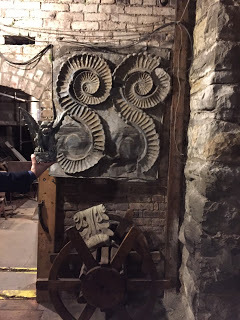
The Chihuly Garden and Museum is not to be missed. The sculptures are incredible and walking through the garden is like being in wonderland. This was one of my favorite things in Seattle. Note: Gargoyles get in free.


Jimi Hendrix's grave is nearby, so Newton and I stopped there to pay our respects:

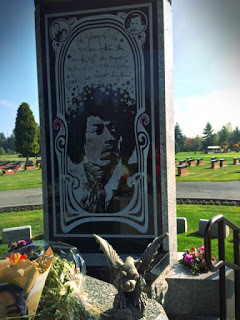
The wall of gum (near Pike Place) is one of those strange oddities that make you both want to look and also look away at the same time. Gross, but fascinating. Check out all the colors:

And let's not forget a Seattle classic: The Space Needle.
Newton may be the first gargoyle to visit it in person!


Newton refers to the Space Needle as a "Top Perch" and gives it 2 talons up!
The Underground tour.
If you're not claustrophobic and can stay on your feet for about 90 minutes, this is a fun way to learn about Seattle's history and hear a few stories. The tour goes through some underground spaces to where the sidewalks were located before the great fire that burned the city down. He's a picture of Newton in the underground at the end of the tour:

The Chihuly Garden and Museum is not to be missed. The sculptures are incredible and walking through the garden is like being in wonderland. This was one of my favorite things in Seattle. Note: Gargoyles get in free.


Jimi Hendrix's grave is nearby, so Newton and I stopped there to pay our respects:


The wall of gum (near Pike Place) is one of those strange oddities that make you both want to look and also look away at the same time. Gross, but fascinating. Check out all the colors:

And let's not forget a Seattle classic: The Space Needle.
Newton may be the first gargoyle to visit it in person!


Newton refers to the Space Needle as a "Top Perch" and gives it 2 talons up!
Published on October 22, 2015 04:54
October 15, 2015
Tips of Writing a Good Fantasy Story
In order for a fantasy world to be believable and accepted by the audience, there are a few things an author should keep in mind when writing in this genre. I’ve compiled these into two short lists of what to do (DO) and what not to do (DON’T).
DO
Use the characters to move the story forward. You can add situations that force them to grow or change or show their true colors, but don’t rely on things outside of the story to move it forward. Situations are generally boring to readers - but how someone reacts in a situation is infinitely more interesting.
Put characters in situations that challenge them. I paired Kelsey with Silence in the Orphanage of Miracles because she lacked patience. Putting her with a mute also helped her to learn more about herself as she watched him interact successfully with others.
Look to everyday life to inspire you and then imagine the same situations and experiences in another world. You may be writing in a fantasy world, but there are elements of the human experience that don’t change - such as the concepts of love, friendship, family, revenge, and war. These elements that are common to our world connect the reader to your story.
DONT:
Make characters say or do anything that goes against who they are. Your characters have identities of their own outside of you. You can control them no more than you can control your own children. Sure, you can provide them guidance and put them in situations that bring out the good or bad in them, but you can not suddenly make a coward have confidence or turn a basically good person evil without a strong motivation to do so (and that motivation needs to be built carefully).
Don’t rely on magic to move the story forward. The story should still be character driven, because this is how your audience connects to your world. See point number 3 above under “DO” for more information.
Don’t make objects or animals talk just for fun. If you anthropomorphize something, it needs a reason and should be part of the overall story plot and structure. Objects generally serve a purpose and animals have specific characteristics that should be included in the story line. For example, I made death a fox in my books because death is cunning and often sneaks up on people. A fox also shares those qualities.
These aren’t hard and fast rules, and no one likes to break rules more than I do. So feel free to break them, but to do so successfully you’ll need to always keep the reader in mind. The reader is, after all, your primary reason for publishing. So make sure that elements of the story don’t cause them to suddenly ask, “Where did that come from?” Our job as writers is to guide the reader safely through our realms without questioning whether or not it could actually exist. We help them to believe in it.
DO
Use the characters to move the story forward. You can add situations that force them to grow or change or show their true colors, but don’t rely on things outside of the story to move it forward. Situations are generally boring to readers - but how someone reacts in a situation is infinitely more interesting.
Put characters in situations that challenge them. I paired Kelsey with Silence in the Orphanage of Miracles because she lacked patience. Putting her with a mute also helped her to learn more about herself as she watched him interact successfully with others.
Look to everyday life to inspire you and then imagine the same situations and experiences in another world. You may be writing in a fantasy world, but there are elements of the human experience that don’t change - such as the concepts of love, friendship, family, revenge, and war. These elements that are common to our world connect the reader to your story.
DONT:
Make characters say or do anything that goes against who they are. Your characters have identities of their own outside of you. You can control them no more than you can control your own children. Sure, you can provide them guidance and put them in situations that bring out the good or bad in them, but you can not suddenly make a coward have confidence or turn a basically good person evil without a strong motivation to do so (and that motivation needs to be built carefully).
Don’t rely on magic to move the story forward. The story should still be character driven, because this is how your audience connects to your world. See point number 3 above under “DO” for more information.
Don’t make objects or animals talk just for fun. If you anthropomorphize something, it needs a reason and should be part of the overall story plot and structure. Objects generally serve a purpose and animals have specific characteristics that should be included in the story line. For example, I made death a fox in my books because death is cunning and often sneaks up on people. A fox also shares those qualities.
These aren’t hard and fast rules, and no one likes to break rules more than I do. So feel free to break them, but to do so successfully you’ll need to always keep the reader in mind. The reader is, after all, your primary reason for publishing. So make sure that elements of the story don’t cause them to suddenly ask, “Where did that come from?” Our job as writers is to guide the reader safely through our realms without questioning whether or not it could actually exist. We help them to believe in it.
Published on October 15, 2015 07:11
August 12, 2015
Sonic Highways: A Lesson in Story Telling
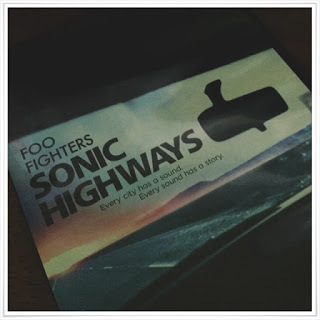 Thanks to a friend, I’ve been watching a set of DVDs which chronicle the Foo Fighters latest recording, a concept album called Sonic Highways. Whether or not you’re a music fan, the way the album and DVD are put together is an outstanding example of story telling.
Thanks to a friend, I’ve been watching a set of DVDs which chronicle the Foo Fighters latest recording, a concept album called Sonic Highways. Whether or not you’re a music fan, the way the album and DVD are put together is an outstanding example of story telling.In the DVDs, each episode shows the band arriving in a city, learning about the musical influences, and then recording a song that exudes the flavor of that space. Each piece usually incorporates a local guest recording artists (such as Joe Walsh in California).
Great music. But how is this related to literature or writing?
There’s a lot we, as writers, can learn from the way Dave Grohl creates his art. First of all, the whole concept of the project stresses the importance of setting. There are things that characters will often do in one location but not in others. As a writer, your story is always a mixture of the people involved and the place they’re in, and what took place in the past in order to create the current environment. A story’s setting isn’t just a location: it’s a place in time that’s the culmination of all that’s come before in that space.
The setting in which you place a story influences actions and sets mood. It’s the same in music as it is in literature as it is in life. What Dave Grohl is tapping into is the subtle differences in culture between cities on the same continent. He's also showing the impact of time on these things. Cities have personalities and atmospheres that have evolved in a particular manner.
Think about the setting in your writing almost as if it’s another character, because it’s just as important to moving the plot along. If you watch these DVDs, notice how different cities produce different musical sounds because of the unique mixture of people who live there or the kinds of struggles and achievements that took place in those locations. These nuances provide the rich texture and context for a story, and these are the kinds of details that bring a story to life.
The tag line on the DVD set is “Every city has a sound. Every sound has a story” and these DVDs tell those stories well. Highly recommended viewing.
Published on August 12, 2015 07:25



